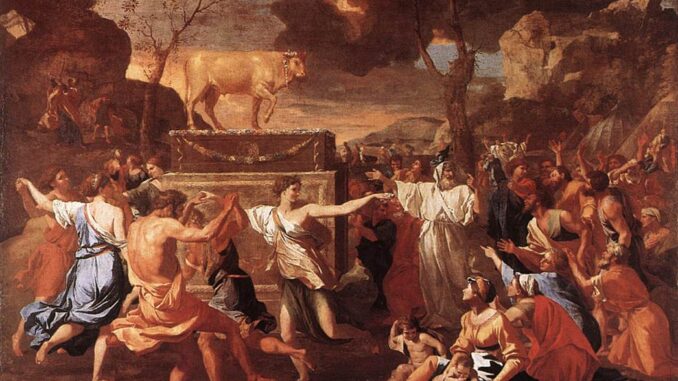
This series explores the Ten Commandments through the words and admonishments of Arthur Pink.
“Thou shalt not make unto thee any graven image, or any likeness of any thing that is in heaven above, or that is in the earth beneath, or that is in the water under the earth. Thou shalt not bow down thyself to them, nor serve them,” is the second Commandment in Exodus 3.
God explains the reason for this commandment in Exodus 3:4-5, saying, “for I the Lord thy God am a jealous God, visiting the iniquity of the fathers upon the children unto the third and fourth generation of them that hate me; And shewing mercy unto thousands of them that love me, and keep my commandments.”
Although the second Commandment is closely related to the first, there are distinctions between the two. While the first Commandment deals with choosing the true God, the second Commandment guides us on how to properly worship Him. The first Commandment establishes who God is, and the second Commandment specifies how we should practice our religious worship. Just as the first Commandment declared Jehovah as the true God, the second Commandment reveals His nature and the appropriate way to honor Him.
” Thou shalt not make unto thee any graven image… Thou shalt not bow down thyself to them, nor serve them.” This commandment strikes against a desire to bring in some aids to the worship of God, which can be perceived by the senses. The reason is obvious: God is incorporeal, invisible, and can be realized only by a spiritual principle, and since that principle is dead in fallen man, he naturally seeks that which accords with his carnality. No one who truly knows God as a living reality needs any images to aid his devotions.
It is a manifest straining of this precept to make it condemn all statuary and paintings: it is not the ingenuity of making but the stupidity in the worshiping of them which is condemned, as is clear from the words “you shall not bow down yourself to them,” and from the fact that God Himself shortly afterwards ordered Israel to “make two cherubim of gold of beaten work” for the mercy seat (Exodus 25:18) and later the serpent of brass. Since God is a spiritual, invisible, and omnipotent Being, to represent Him as being of a material and limited form is a falsehood and an insult to His majesty. Under this most extreme corruption of mode-image worship-all erroneous modes of Divine homage are here forbidden.
This second Commandment is but the negative way of saying “God is Spirit: and they that worship Him must worship Him in spirit and in truth” John 4:24.
In prohibiting images, God also rules out any other forms of worship that He hasn’t specifically established. This includes all ways of worshiping, even of the true God, that differ from what God has instructed in His Word. Such practices are referred to as “will worship” (as mentioned in Colossians 2:23) and include any distortion of true worship and any tendency towards superstitious practices in serving God. This Commandment does not allow for any human creativity in worship. For example, Christ criticized the ritual of washing hands because it was a human addition to God’s laws.
The Bible sets clear limits for worship, and we shouldn’t add to or take away from these. When applying this rule, it’s important to differentiate between the essential and non-essential aspects of worship. Any practice that people try to enforce as a part of Divine worship should be rejected if it’s not explicitly required in the Scriptures. However, certain non-essential practices and modifications followed by the group that don’t have direct scriptural backing but promote decency and order without detracting from the solemnity and focus of spiritual worship, should be accepted. Ambrose gave a wise advice: “If you will neither give offense nor take offense, conform yourself to all the lawful customs of the churches where you come.”
This Commandment is enforced by three reasons. Firstly, it’s underlined by the authority of God, who is depicted as a “jealous God”, powerful and ready to punish unfaithfulness, much like a betrayed spouse would. Secondly, it warns of severe consequences, extending the repercussions of idolatry and sin across generations, impacting not just the individual but their descendants as well, reflecting the notion that parental sins can influence and shape the behavior of their children. Finally, it offers a positive incentive for obedience, promising mercy to thousands of generations of those who love and obey God. This highlights the idea that love for God is shown through obedience, and this love results in blessings, not only for the individual but also for their descendants, reinforcing the impact of one’s actions and beliefs on future generations.
Arthur W. Pink, born in Nottingham, England, in 1886, pastored churches in Colorado, California, Kentucky, and South Carolina. He moved to Sydney, Australia, and then returned to England in 1934. Pink relocated to Lewis, Scotland, in 1940 and remained there until his death in 1952 at the age of 66.



